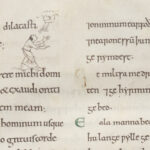SIGLUM online lecture: “Alfred the Great’s Psalter” by prof. Jane Toswell, Department of English and Writing Studies, Western University, Canada
Research Group for the Study of Manuscripts SIGLUM extends an invitation to an online lecture (in English) on “Alfred the Great’s Psalter” by Professor Jane Toswell from the Department of English and Writing Studies, Western University, Canada. The lecture will take place at the University of Warsaw on 8th March 2022 at 16:00 (CET) via Zoom.For links to the meeting please contact siglum@wn.uw.edu.pl
In other respects, however, psalter activity in ninth-century England was innovative and creative: the first glosses appeared in the Blickling Psalter in the eighth century, but the first extant full vernacular gloss of a psalter was added to the eighth-century Vespasian Psalter in the mid-ninth century. The abbreviated psalter which seems likely to have been prepared by Bede survives only in three ninth-century manuscripts, including the Book of Cerne. It is based on the Hebraicum psalter; there are possible other versions of abbreviated psalters prepared during the ninth century, which reflect the other Latin psalm versions. Alcuin provided a copy of Bede’s abbreviated psalter to one colleague on the continent, and he seems to have remained engaged with breviate psalters, as were other Carolingian and perhaps Irish colleagues. Devotion to the psalter as a part of the Bible that can readily be extracted for special treatment is also evident with the first fully illustrated psalter extent from the continent in the ninth century: the Utrecht Psalter. This manuscript did not obviously arrive in England until much later, to be the source of much late Old English psalter illustration, notably the Harley Psalter, but thinking about it does suggest that ninth-century psalter developments in England took place within a larger European sphere, and should be addressed from that perspective as well.


